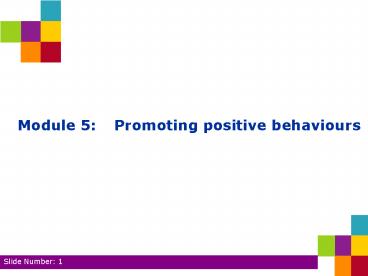Module 5: Promoting positive behaviours PowerPoint PPT Presentation
1 / 6
Title: Module 5: Promoting positive behaviours
1
- Module 5 Promoting positive behaviours
2
Module 5 Promoting positive behaviours
- Learning Outcomes
- At the end of this module participants will be
able to - 1. Understand that there may be a range of
reasons that contribute to various behaviours. - 2. Discuss attitudes to behaviour and how we
judge whether behaviours are acceptable or
unacceptable. - 3. Understand that a caring approach includes a
range of strategies to promote positive
behaviours. - 4. Accept the importance of carers managing
stress for themselves, their families, and the
child or young person.
3
Module 5 Promoting positive behaviours
Content 1. Understanding childrens feelings
and behaviours. 2. Exploring our own beliefs and
attitudes about different behaviours. 3. Positi
ve strategies to promote positive
behaviours. 4. Managing challenging behaviour if
it occurs. 5. Finding and providing support for
yourself, your family and the child or young
person.
4
Understanding childrens feelings and behaviours
- The first step in understanding the meaning of
behaviour is to understand what motivates a child
or young person to behave in a certain way what
need is the child trying to meet? - We can spend all our energy trying to control or
change behaviour, but it will be futile if the
underlying need is not met. - The child will find other behaviours to meet
that need eg a child may engage in a range of
behaviours to get attention because of a need for
security and love. Those behaviours may be
modified, but if the underlying need is not met,
the child will find other ways to act out the
need.
5
Principles of Social Learning
- 1. Children may behave the way they do because
they have learned that behaviour, or because they
have not learned alternative, more positive ways
to act. - 2. Children rarely learn from one cycle of doing
and receiving consequences. Repetition over time
is a necessary part of learning. - 3. The more consistent and immediate the parent
is in giving consequences, the faster the child
learns. - 4. There are three primary ways of learning
explaining, rewarding, and providing negative
consequences - 5. Acknowledging positive behaviour is as
important as correcting negative behaviour. - 6. Set a good example for the child to follow. If
you want the child to be on time, to speak
softly, or to be polite, make sure you do those
things too.
6
Range of responses to promote positive behaviours

